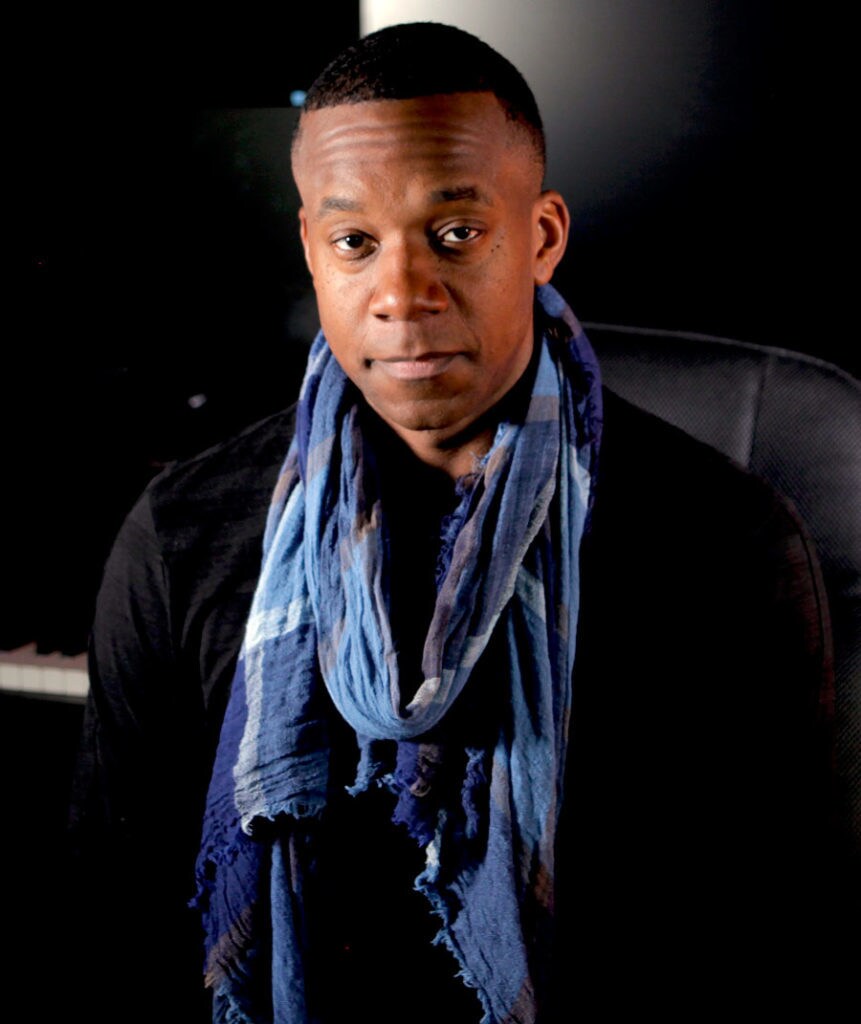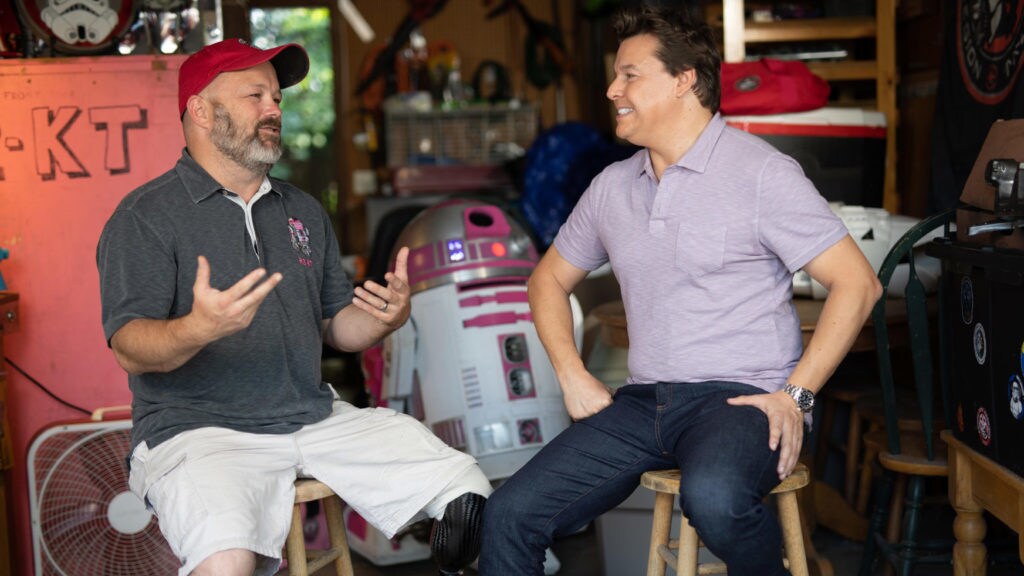The composer discusses translating fan journeys to music for Lucasfilm's new digital series.
There's a powerful moment at the end of this week's installment of Our Star Wars Stories featuring Christina Cato, a fan who taught herself how to build droids. Cato laughs nervously when asked if she sees herself as a role model for young women. Slowly and humbly she composes herself and says, "I would like to be." Suddenly, and subtly, the episode's score perks up. Strings and woodwinds make their presence more and more known. Bass tones grow bolder, and finally the music swells as Cato confidently closes by telling host Jordan Hembrough that she'd gladly teach him how to build his own R2 unit. She's come full circle. It's an emotional and meaningful climax, but its impact comes not just from Cato's words. It's the music, written by composer Jermaine Stegall, that makes this work of documentary storytelling transcend.
Stegall was born in 1977, which placed him squarely as an '80s kid -- meaning he was subject to some amazing pop culture that, for all intents and purposes, informed the direction his life would go. "I grew up in the era of Star Wars always being around," Stegall says. "I loved all the Spielberg movies of the '80s. I think the first movie I saw in theaters was E.T., and I also saw The Goonies, Return of the Jedi, and the Indiana Jones sequels. It was a great time." Growing up in Illinois near Chicago, Stegall had an interest in music from an early age, in addition to film. He first played violin, then saxophone throughout junior high and high school. When it was time for college, he was set to study music but still had no plan on how he would make it his career. Then, something happened.
"In 1995, it was the summer I was going to go away to college and I saw Apollo 13. When the ship took off, it was like a lightbulb went off for me," he says. "That's when I knew someone was doing music for movies on purpose." Somewhere inside, however, it would seem he knew this already; in an age of grunge and gangsta rap, most of his CD collection consisted of soundtracks. It just took something to flip the switch.
Around 1997, Stegall took his first stab at composition for a college project while studying at Northern Illinois University, learning what it was like to put notes to paper and hear an orchestra play your work. "That was the inspiration that told me, 'It's possible to do this,'" he says. (The project was a score for a hypothetical Universal logo.) He'd then write music for student films, getting more and more experience at scoring. After finishing college in 2000, Stegall secured a master's degree in music composition from the University of North Texas. Following that, he attended the film music graduate program at the University of Southern California from 2003 to 2004, did more composing wherever he could, and then landed a particularly major project in 2011: writing additional music for Marco Beltrami's Scream 4 score. As someone who loved the original Scream score, this was watershed moment for Stegall. "I was absolutely terrified," he says. "I literally stared at the Dimension Films logo for like 45 minutes before I wrote a note of music. It was such a big deal, and now here I was sitting, and it was like, 'What are you going to do?'" Stegall continued building his career and developing his voice as an artist, assisting other composers and scoring short films and indie features, with credits including Supergirl and Stretch Armstrong. But always a figurative student of John Williams, the new era of Star Wars invigorated Stegall.
"I felt like everything was real again," he recalls after seeing the first trailer for Star Wars: The Force Awakens in 2015. "Everything was fresh. There were going to be more movies, and there was excitement for people who grew up with it -- that they might be able to touch its DNA and the fabric of creating it." Stegall made a conscious effort to practice writing more in the Williams style -- pieces with themes and a more sweeping feel. He applied for the Sundance Institute's Music and Sound Design Labs, and ended up studying at Skywalker Ranch. This, in many ways, brings us to today and Our Star Wars Stories.
Our Star Wars Stories, as it came to be known, was a long-gestating project hatched by Jordan Hembrough (Toy Hunter) and Lucasfilm's Mickey Capoferri, senior director, online content and programming. The idea was for a digital series that would tell Star Wars fans' personal tales in relation to the saga. Once the project was a go, production moved quickly; five episodes were shot over two weeks in late August, as Hembrough and a small crew traveled the country meeting devotees of Star Wars. There was the emotional story of Columbia, South Carolina, resident Albin Johnson, the founder of the 501st Legion fan group who lost his daughter to cancer, only to be lifted up by his fellow fans; Robin, a Bernardsville, New Jersey, doctor whose career path was inspired by Star Wars; the previously mentioned Christina Cato of Beaverton, Oregon, who taught herself how to build a droid; FJ, from Washington Township, New Jersey, who found the courage to be himself through Star Wars; and the Perales family of Anaheim, California, who cosplay together to great effect. So, a wide range of stories, all with their own layers and arcs. Capoferri, however, wasn't quite sure what he would do for music. But then, inspiration struck.
"You know, Mickey and I just happened to be meeting randomly about whatever," Stegall says. "He was about to start shooting and he said, 'You know, I have this thing coming up. It hadn't really crossed my mind to use original music as far as scoring it, but it might be interesting to you.' And of course, it completely was. It sounded genuine and heartfelt and interesting, and most documentaries that are good, are."
Stegall was on board -- the challenge, now, was the same he faced on Scream 4: Here you are. What are you going to do? He couldn't reuse music from the Star Wars films, yet it had to sound like Star Wars. Moreover, it had to sound like Star Wars and work for non-fiction.
"I had to think of it as not just a piece of Star Wars content, but a documentary that has a certain amount of information that needs to come across clearly," he says. "But it's possible to be somewhat stylized in the way that I underscore that, in that there are a lot of harmonic and melodic things you can do that are in the style of the language that John Williams has set up, while still understanding that it needs to have a certain level of pace, and we need to outline the sections of the shows structurally. And it also has to feel like you're in that world, sonically, somehow." He had to figure this all out quickly; the show would be weekly, and debut in just over a month after shooting wrapped. Stegall would have to write episode to episode, week to week.
Three installments in, it would appear that Stegall has pulled it off and then some. In Our Star Wars Stories, the scores never call attention to themselves, and seem to cushion the story of the fan. When Albin Johnson recalls seeing the spectacle of Star Wars for the first time, intercut with clips of dogfights and Obi-Wan versus Vader, the music rises to excitement; when Johnson gently discusses his daughter Katie's illness, somber flutes and melancholy strings seem to feel his pain. But as the story continues and Katie is mentioned more and more, there's a gentle, hopeful feel to the score.
"I wanted to make a theme for his daughter," Stegall says. "Something that could be used when he talks about her. And when he talks about losing her, there's closure."
For each episode's music, Stegall writes on piano, sketching out ideas and later adding full orchestration. He writes specifically for the show's subjects -- to the speed with which they speak, their personalities, their general spirit. "When we're talking to Robin, she has a lot more energy to her speech," he says. "She talks about Leia a lot and relating to Leia. So sonically and harmonically, I wanted to stay in that world, and create a theme that had similarities to Princess Leia's." Within the overall framework of an episode, Stegall's scores bob and weave, rise and fall, and ultimately, reach a climax. If you listened to them separate from the show, they'd tell their own story.
Two more episodes are on the way, and at the time of this article's publication, Stegall is crafting their scores. The irony, without overstating it, is that this work is becoming his own Star Wars story. "To me, this is important," he says. "We're documenting something that is interesting and very, very relevant. I wanted to approach it as if every single note is very important to feeling authentic to Star Wars.
"It's been an opportunity to contribute musically to something that is very close to me, and seems very close to so many people in the world," he continues. "I'm sure there are many, many more stories to be told. It's exciting to be a part of their journey and interpret their journey through music."
New installments of Our Star Wars Stories will be released on the official Star Wars YouTube, Twitter, and Facebook pages, and on StarWars.com every Tuesday.
Dan Brooks is Lucasfilm’s senior content strategist of online, the editor of StarWars.com, and a writer. He loves Star Wars, ELO, and the New York Rangers, Jets, and Yankees. Follow him on Twitter @dan_brooks where he rants about all these things.
Site tags: #StarWarsBlog, #OSWS



